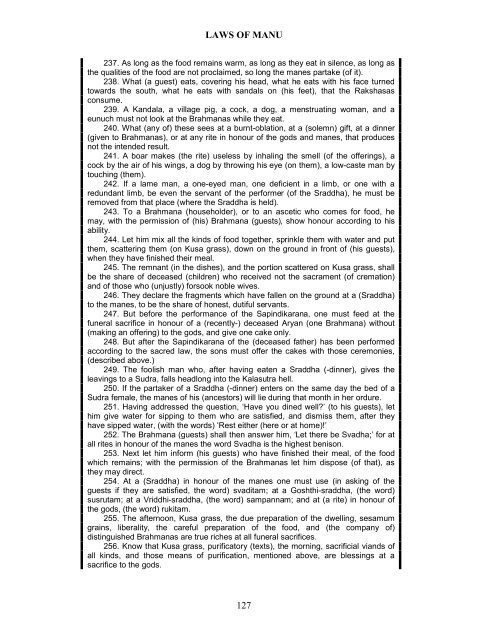You also want an ePaper? Increase the reach of your titles
YUMPU automatically turns print PDFs into web optimized ePapers that Google loves.
LAWS OF MANU<br />
237. As long as the food remains warm, as long as they eat in silence, as long as<br />
the qualities of the food are not proclaimed, so long the manes partake (of it).<br />
238. What (a guest) eats, covering his head, what he eats with his face turned<br />
towards the south, what he eats with sandals on (his feet), that the Rakshasas<br />
consume.<br />
239. A Kandala, a village pig, a cock, a dog, a menstruating woman, and a<br />
eunuch must not look at the Brahmanas while they eat.<br />
240. What (any of) these sees at a burnt-oblation, at a (solemn) gift, at a dinner<br />
(given to Brahmanas), or at any rite in honour of the gods and manes, that produces<br />
not the intended result.<br />
241. A boar makes (the rite) useless by inhaling the smell (of the offerings), a<br />
cock by the air of his wings, a dog by throwing his eye (on them), a low-caste man by<br />
touching (them).<br />
242. If a lame man, a one-eyed man, one deficient in a limb, or one with a<br />
redundant limb, be even the servant of the performer (of the Sraddha), he must be<br />
removed from that place (where the Sraddha is held).<br />
243. To a Brahmana (householder), or to an ascetic who comes for food, he<br />
may, with the permission of (his) Brahmana (guests), show honour according to his<br />
ability.<br />
244. Let him mix all the kinds of food together, sprinkle them with water and put<br />
them, scattering them (on Kusa grass), down on the ground in front of (his guests),<br />
when they have finished their meal.<br />
245. The remnant (in the dishes), and the portion scattered on Kusa grass, shall<br />
be the share of deceased (children) who received not the sacrament (of cremation)<br />
and of those who (unjustly) forsook noble wives.<br />
246. They declare the fragments which have fallen on the ground at a (Sraddha)<br />
to the manes, to be the share of honest, dutiful servants.<br />
247. But before the performance of the Sapindikarana, one must feed at the<br />
funeral sacrifice in honour of a (recently-) deceased Aryan (one Brahmana) without<br />
(making an offering) to the gods, and give one cake only.<br />
248. But after the Sapindikarana of the (deceased father) has been performed<br />
according to the sacred law, the sons must offer the cakes with those ceremonies,<br />
(described above.)<br />
249. The foolish man who, after having eaten a Sraddha (-dinner), gives the<br />
leavings to a Sudra, falls headlong into the Kalasutra hell.<br />
250. If the partaker of a Sraddha (-dinner) enters on the same day the bed of a<br />
Sudra female, the manes of his (ancestors) will lie during that month in her ordure.<br />
251. Having addressed the question, ‘Have you dined well?’ (to his guests), let<br />
him give water for sipping to them who are satisfied, and dismiss them, after they<br />
have sipped water, (with the words) ‘Rest either (here or at home)!’<br />
252. The Brahmana (guests) shall then answer him, ‘Let there be Svadha;’ for at<br />
all rites in honour of the manes the word Svadha is the highest benison.<br />
253. Next let him inform (his guests) who have finished their meal, of the food<br />
which remains; with the permission of the Brahmanas let him dispose (of that), as<br />
they may direct.<br />
254. At a (Sraddha) in honour of the manes one must use (in asking of the<br />
guests if they are satisfied, the word) svaditam; at a Goshthi-sraddha, (the word)<br />
susrutam; at a Vriddhi-sraddha, (the word) sampannam; and at (a rite) in honour of<br />
the gods, (the word) rukitam.<br />
255. The afternoon, Kusa grass, the due preparation of the dwelling, sesamum<br />
grains, liberality, the careful preparation of the food, and (the company of)<br />
distinguished Brahmanas are true riches at all funeral sacrifices.<br />
256. Know that Kusa grass, purificatory (texts), the morning, sacrificial viands of<br />
all kinds, and those means of purification, mentioned above, are blessings at a<br />
sacrifice to the gods.<br />
127


















